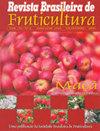不同1-MCP剂量和贮藏温度对菲荷果采后行为的影响
IF 0.9
4区 农林科学
Q4 HORTICULTURE
引用次数: 0
摘要
菲荷是哥伦比亚一种极具出口潜力的作物。然而,由于它是一种更年期水果,呼吸速率高,对果蝇易感,因此采后保质期短。冷藏和使用1-甲基环丙烯(1-MCP)等技术增加了采收后的时间,延长了果实的品质。本研究的目的是评价不同贮藏温度和1-MCP用量对采后feijoa果实的影响。采用2x4因子排列的完全随机设计,其中第一个因素是温度(4°C和16°C),第二个因素是1-MCP剂量(0,30,60和90µg L-1),共8个处理。4℃处理的质量损失和呼吸速率较低,而光度、色度、可溶性固形物和抗氧化活性最高。4°C时1-MCP最低剂量的可滴定酸度和内果皮张力值最高;相反,在4°C和16°C的最高剂量下,酚类化合物的值最高。冷藏后的菲荷果保质期在36 - 42天之间,而在16°C下储存的菲荷果保质期只有14天,这凸显了冷藏的重要性。本文章由计算机程序翻译,如有差异,请以英文原文为准。
Postharvest behavior of feijoa fruit (Acca sellowiana Berg) subjected to different 1-MCP doses and storage temperatures
Abstract Feijoa is a promising crop in Colombia with high export potential. However, its postharvest shelf-life is short since it is a climacteric fruit with high respiration rates and susceptibility to fruit flies. Techniques such as refrigeration and the use of 1-methylcyclopropene (1-MCP) increase the post-harvest period and prolong fruit quality. The objective of this research was to evaluate the effect of different storage temperatures and 1-MCP doses on postharvest feijoa fruits. A completely randomized design with a 2x4 factorial arrangement was used, where the first factor was temperature (4 and 16 °C), and the second factor was the 1-MCP dose (0, 30, 60 and 90 µg L-1), for a total of eight treatments. The treatments at 4 °C presented lower values for mass loss and respiratory rate, while luminosity, chromaticity, soluble solids and antioxidant activity showed the highest values. The lowest 1-MCP doses at 4 °C had the highest values of titratable acidity and endocarp tone; on the contrary, the highest doses at 4 and 16 °C presented the highest values of phenolic compounds. The refrigerated feijoa fruits had a shelf-life between 36 and 42 days, while those stored at 16 °C only had commercial quality for 14 days, highlighting the importance of cold storage.
求助全文
通过发布文献求助,成功后即可免费获取论文全文。
去求助
来源期刊
CiteScore
1.50
自引率
20.00%
发文量
34
审稿时长
4-8 weeks
期刊介绍:
The Revista Brasileira de Fruticultura (RBF) publishes technical articles and scientific communications in the area of fruit crops, referring to results of original searches and unpublished papers in Portuguese, Spanish or English, and 1 or 2 reviews per edition, of invited authors.

 求助内容:
求助内容: 应助结果提醒方式:
应助结果提醒方式:


